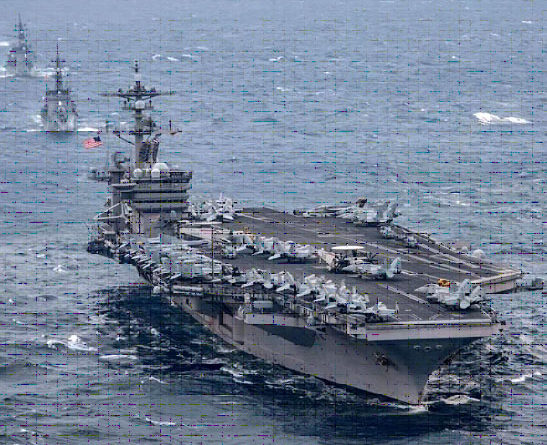Pentagon Pulls China’s Invite To Pacific Naval Exercises
Washington (AFP) May 23, 2018
The Pentagon has pulled its invitation for China to join maritime exercises in the Pacific because of Beijing’s “continued militarization” of the South China Sea, an official said Wednesday, in the latest sign of US-China strains.
China hit back at the decision, calling it “very non-constructive” and saying it was taken without due reflection.
Personnel from more than two dozen countries train together and work on seamanship across the vast region for the biennial Rim of the Pacific (RIMPAC) exercise organized by the US Navy.
But the United States now says China’s behavior in the South China Sea runs counter to the spirit of the drills.
“China’s continued militarization of disputed features in the South China Sea only serves to raise tensions and destabilize the region,” Pentagon spokesman Lieutenant Colonel Chris Logan said.
“We have disinvited the PLA Navy from the 2018 Rim of the Pacific Exercise. China’s behavior is inconsistent with the principles and purposes of the RIMPAC exercise.”
China’s Foreign Affairs Minister Wang Yi said the US decision to exclude it from RIMPAC was “very non-constructive.”
“It’s also a decision taken lightly and is unhelpful to mutual understanding between China and the US,” Wang said at a press conference with Secretary of State Mike Pompeo after the two met in Washington.
Pompeo did not comment on the matter, saying only that the pair had had a “good discussion” about American concerns of militarization of the South China Sea.
Military Hardware
China has deployed anti-ship missiles, surface-to-air missile (SAM) systems and electronic jammers to “contested features” in the Spratly Islands region of the South China Sea, Logan said.
“While China has maintained that the construction of the islands is to ensure safety at sea, navigation assistance, search and rescue, fisheries protection and other non-military functions, the placement of these weapon systems is only for military use,” Logan said, noting that the landing of a Chinese bomber on Woody Island had only exacerbated strains.
The decision to pull China’s invitation comes amid new tensions between Beijing and Washington.
President Donald Trump said Wednesday that he was not satisfied with talks aimed at averting a trade war with China.
And on Tuesday, he suggested that Chinese President Xi Jinping might have played a role in North Korea’s recent threats to withdraw from a planned summit with the US.
‘Freedom of Navigation’
China claims most of the South China Sea, believed to hold vast oil and gas deposits and through which $5 trillion in trade passes annually. It has built up islands and military installations across the region.
Brunei, Malaysia, the Philippines, Taiwan and Vietnam also have claims in the sea.
The US Navy periodically conducts “freedom of navigation” operations in which naval vessels sail close to the Chinese-claimed militarized islets.
Logan said the Pentagon had urged China to remove its military installations “immediately” and to “reverse course” on its militarization of the sea.
Given China’s growing military confidence and its heavy investment in the South China Sea, such a move is highly unlikely.
Logan added that Xi had broken a promise he made to the international community that China would not militarize the Spratly Islands.
According to the Navy, this year’s RIMPAC was originally slated to include more than 1,000 personnel from 27 countries.
An invitation to the exercises, which are held in and around the Hawaiian Islands and Southern California, carries some political weight as it offers legitimacy and acceptance to participating military forces.
Thailand was disinvited in 2014 following a coup.
RIMPAC began in 1971 and was held annually until 1974, when it switched to every two years due to its large scale. The founding nations are Australia, Canada and the United States.
China has participated twice previously, in 2014 and 2016.
Source: WP

